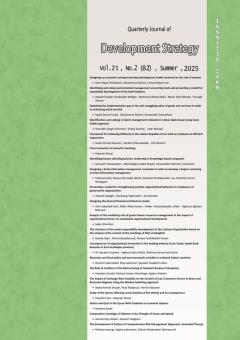Identifying and rating environmental management accounting tools and presenting a model for sustainable development of the hotel industry
Subject Areas : Economic
Azadeh Elsadat Torabzadeh Bafeghi
1
,
Mahmoud Moinuddin
2
*
![]() ,
nasim Shah Moradi
3
,
Forough heirani
4
,
nasim Shah Moradi
3
,
Forough heirani
4
1 - PhD Student, Department of Accounting, Yazd Branch, Islamic Azad University, Yazd, Iran
2 - Professor, Department of Accounting, Yazd Branch, Islamic Azad University, Yazd, Iran
3 - Assistant Professor, Accounting Department, Yazd Branch, Islamic Azad University, Yazd, Iran
4 - Assistant Professor, Accounting Department, Yazd Branch, Islamic Azad University, Yazd, Iran
Keywords: Environmental management accounting tools, fuzzy screening, environmental management accounting model, hotel industry.,
Abstract :
The consequences of tourism industry activities can cause different environmental problems, which can be harmful and detrimental to different groups. Environmental management accounting (EMA) integrates the two main principles of sustainable development, environment and economy, and allows companies to control the environmental consequences of business in the form of monetary units. The main objective of the present study is to identify and rate environmental management accounting tools and present an appropriate model for implementing environmental management accounting in the hotel industry. The research method is a survey and qualitative type. In the first step of the research, the statistical population includes specialists and experts in the field of hotel management. Sampling from this population was carried out purposefully and finally 9 experts were selected. By reviewing the literature and theoretical background, environmental management accounting techniques in the hotel industry were identified and the importance of each was determined using the fuzzy screening method. The environmental cost accounting techniques, full cost accounting, environmental investment efficiency assessment and comprehensive quality environmental management were found to have a very high importance. Then, using the content analysis method, a suitable model for implementing environmental management accounting in the hotel industry based on the Environmental Management System (EMS) was proposed. This model includes 4 main stages: planning, implementation and control, measurement and evaluation, and review.
منابع
- جعفری، بهزاد؛ خیرالهی، فرشید؛ چاوشانی، مجتبی و فیض جوادیان، سید حامد (1402). ارائه مدل مفهومی عملکرد زیستمحیطی استراتژیک با تاکید بر حسابداری مدیریت استراتژیک (مطالعه موردی: شرکتهای آلاینده بورس). حسابداری مدیریت، پیاپی 58، ص 109-93.
- جمال لیوانی، حمید؛ معطوفی، علیرضا؛ صفری گرایلی، مهدی و گرکز، منصور (1402). طراحی مدل حسابداری مدیریت ضایعات. دانش حسابداری، (53)، ص 99-77.
- حسینی زاده هرات، زهرا؛ معین الدین، محمود و حیرانی، فروغ (1399). طراحی و ارزیابی مدل رفتارهای سبز و عملکرد مالی در هتلهای شهر یزد. حسابداری مدیریت، دوره 13(47)، ص 70-53.
- حسینی زاده هرات، زهرا؛ معین الدین، محمود و حیرانی، فروغ (1399). طراحی و تبیین مدل هتل¬داری سبز سودآور مبتنی بر استراتژی داده بنیاد. گردشگری و توسعه، 9(4)، ص 283-269.
- سجادی، سید حسین و جلیلی، امیر (1386). حسابداری زیستمحیطی. حسابدار، دوره 22(186).
- ملانظري، مهناز (1382). حسابداري مدیریت محیط زیست. پژوهشنامۀ علوم انسانی و اجتماعی، 3(8)، 141.
- Bouten, L., and Hoozée, S. (2013). On the interplay between environmental reporting and management accounting change. Management Accounting Research, 24: 333 – 348.
- Burritt, R. L., Saka, C. (2006). Environmental management accounting applications and eco-efficiency: case studies from Japan. Journal for Cleaner Production, 14: 1262-1275.
- Christ, K. L., and Burrit R. L. (2013). Environmental management accounting: the significance of contingent variables for adoption. Journal for Cleaner Production, 41: 163 – 173.
- Erdogan, N., and Baris, E. (2007). Environmental protection programs and conservation practices of hotels in Ankara, Turkey. Tourism Management, 28(2): 604–614.
- Fakoya, M.D., and van der Poll, H.M. (2013). Integrating ERP and MFCA systems for improved waste-reduction decisions in a brewery in South Africa. Journal of Cleaner Production, 40: 136 – 140.
- Font, X., Walmsley, A., McCombes, S. C. L., and Häusler, N. (2012). Corporate social responsibility: The disclosure-performance gap. Tourism Management, 33(6): 1544 – 1553.
- Janković, S., and Krivačić, D. (2014). Environmental accounting as perspective for hotel sustainability: Literature review. Tourism and Hospitality Management, 20 (1): 103 – 120.
- Janković, S., Peršić, M., and Zanini-Gavranić, T. (2011). Framework for development of Environmental Management Accounting in Croatian hospitality industry. Sustainable Tourism: Socio-Cultural, Environmental and Economic Impact, 121 – 135.
- Maunders, K. T., and Burritt, R. L. (1991). Accounting and ecological crisis. Accounting, Auditing & Accountability Journal, 4(3).
- Qian, W., Burritt, R., and Chen, J. (2015). The potential for environmental management accounting development in China. Journal of Accounting and Organizational Change, 11 (3): 406 – 428.
- Rao, K. K., Tilt, C. A., and Lester, L. H. (2012). Corporate governance and environmental reporting: an Australian study. Corporate Governance. The international journal of business in society, 12 (2): 143 – 163.
- Rosmini, I., Khalizul, Kh., Hartini, J., and Ramlee, I. (2021). Accounting for Environmental Sustainability of the Tourism Industry: The Case of Perhentian Island. Turkish Journal of Computer and Mathematics Education, 12(3): 613-625.

